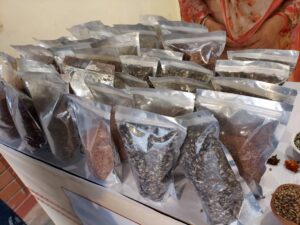
Anushka Trivedi, National Defence
New Delhi, 21 March 2021
The newly launched Farm Acts have attracted attention not only from the farmer community but also from students, politicians and celebrities world-wide. These laws have been forecasted by the government as revolutionary reforms that would end the monopoly of ‘middlemen’ and allow farmers an ‘open market’ to practice their trade. However, the farmer protests have been continuing with the farmers asking for an absolute roll back of these laws,from the government.
FARM ACTS ( 2020) – An Overview
ACT-1: The Farmers Produce Trade and Commerce ( Promotion and Facilitation) Act, 2020.
This act proposes five major provisions, broadly regarding –
1) It permits the expansion of trade areas outside APMCs ( Agricultural Produce Marketing Committee) such as farm gates, warehouses, cold storages, factories, for the purpose of export etc.
2) It allows the farmers to sell their produce outside the designated area of their APMC, permitting them entrance into inter state and even intra state APMCs.
3) It allows the farmers to sell their produce through Online Trading, thereby drastically increasing their opportunity to make profit.
4) It prohibits any state taxes in APMCs.
5) It allows for a Dispute Settlement Mechanism, wherein the farmer is not required to approach the Civil Court and the matter is dealt within 30 days by the designated authority.
This act drastically enables the trade options for the farmers, provides better competition, allows for more innovation and business possibilities.
ACT-2 : The Farmers ( Empowerment and Protection ) Agreement on Price Assurance and Farm Services Act 2020.
This act broadly proposes the following provisions-
1) It gives the farmer Price Assurance by allowing for contract based trading. The farmer is allowed to create an agreement with a sponsor/investor for his produce and services.
2) The contract limit between both parties cannot exceed 5 years.
3) Government claims that it ‘may’ provide guidelines (Model Contracts) for the creation of the
Contract of Agreement between the sponsor and the farmer to safeguard the interest of the farmer, though there is no assurance for the same.
4) There would be a price fixing mechanism wherein the farmer is assured a minimum amount in the contract along with the flexibility to increase the price in case MSP (Minimum Selling Price) rises in the APMCs.
5) There would be a Delivery Payment Mechanism wherein all payment must be given to the farmer by the sponsor on the day of the delivery. In extraordinary cases, no more than 3 days times is allowed.
6) If the sponsor/investor chooses to create a permanent structure on the farmers land, he must remove it as soon as the project gets completed. Land acquisition is prohibited in any case.
7) The sponsors must go through a process of identification and registration.
8) In cases of divine acts both the parties- sponsor and farmer would be exempted from any kind of punishment.
9) It allows for the creation of a Conciliation Board for dispute settlement.
10) Greater penalty to the sponsor/investor in case of disobedience of the agreement.
11) Provision for the involvement of Aggregators and Farm Service Providers.
ACT -3: The Essential Commodities ( Amendment ) Act, 2020. ( The principal Essential Commodities Act exists since 1955 )
This act broadly proposes the following provisions-
1) This act allows the government to regulate the supply of essential commodities only under extraordinary circumstances.
2) Stock limits will not be imposed on farmers regarding the essential commodities.
3) Stock limits can only be imposed in case of extraordinary circumstances such as – war, famine, steep price rise.
4) These commodities will only be considered essential in the above stated ‘extraordinary’ circumstances.
POTENTIAL MERITS OF THE FARM BILLS (2020)
The newly launched farm bills are beneficial to the farmers in terms of providing them an open market to expand their trade. While earlier they could only sell their produce to APMCs in their own areas, now, with the new laws they can carry out their trade anywhere (APMCs and otherwise) within their state or in any other state nationwide, without state tax being levied on them. This opening up of new trade spaces could provide for better competition, innovation and business possibilities.
This would end the unequal treatment of the farming sector by allowing it an open market to practice trade ( as is allowed to any other sector ). The inter state connectivity between the farmer and the buyer would allow for better fulfillment of requirements by both the parties without any barriers to restrict a smooth flow of demand and supply.
With the farmer becoming more aware of the needs of the buyers worldwide, there is a possibility that the needless over farming of certain crops, such as – rice & wheat (which require a huge amount of water) would stop. Rather, crops that are in demand and maybe also require less water consumption would be cultivated for the profit of all – the buyer, the farmer and nature.
With the government no more regulating the supply of essential commodities, the farmer will get a chance to grow the required amount of crops to expand his trade – even internationally.

PROBLEMS WITH THE FARM BILLS (2020) ( Farmer’s demands )
One of the major issues concerning the farmers in these acts is the prohibition to approach civil courts in case of disputes. The disputes are to be handled by authorities such as – DM & collectors locally. Many are not satisfied with this.
Secondly, farmers are concerned that if the market prices increase above the rate which they have pre-fixed in the contract agreement then they would have to face a loss. The government has not provided for a concrete ‘Model Contract’ that would ensure a flexible approach wherein the farmer is allowed to modify the amount mentioned in the contract in case the market price of their produce increases.
The regulations regarding the sponsors who would be trading with the farmers are really weak with only ‘PAN Card’ being the required document for their registration. Additionally, there is a fear of the creation of artificial scarcity with the entry of private investors.
OTHER CONCERNS-
1) APMC was originally created to safeguard the farmers from exploitation through the creation of auction halls, shops, Commission Agents, Records and MSP. However, APMC has it’s faults; mainly – the cascading taxes and the creation of cartels. Cartels are created by the buyers in APMC when they all mutually decide on a specific price in which they would buy the farmer’s produce, disallowing the farmer to make a reasonable profit.
2) Secondly, comes the issue of corruption in the Food Corporation Of India (F.C.I) . F.C.I is supposed to procure crops ( wheat and rice ) from the farmer at M.S.P if he is unable to sell it anywhere else. There have been reports of corruption in many of F.C.I’s offices wherein they deny to buy the produce from the farmer by giving excuses such as the unavailability of space in warehouses etc., forcing the farmer to sell his produce to a middleman at lower rates than the M.S.P. This middleman has usually joined hands with the F.C.I officials and sells off the same produce to them at lower rates, thereby creating black income.
3) If APMCs have to survive after the arrival of private investors/ sponsors, it is required that both APMCs and the new private markets are on a level playing field. This is possible only if the taxes that are levied in APMCs are also levied in the new markets or , if the taxes are entirely removed from both the markets.
4) Regulations regarding the corporates and traders are pretty weak. There should be stricter regulations regarding their registration than just a PAN card.
5) Tribunals/courts should be created solely for the purpose of dealing with farmer related disputes.
FOREIGN DIRECT INVESTMENT IN THE AGRICULTURAL SECTOR IN INDIA
India’s agricultural sector is an attractive place for foreign investments given the fact that India holds the second largest agricultural land in the world. At present,India allows for a 100% foreign direct investments regarding the following agricultural activities –
- a) Floriculture, Horticulture, Apiculture and cultivation of mushrooms and vegetables under controlled circumstances.
- b) Animal husbandry and Fish farming
- c) Services related to agriculture and related sectors d) tea plantations
The laws pertaining to land acquisition by foreign elements are quite strict in India and are getting in the way of greater investments being made to the agricultural industry.
The greatest amount of foreign investment in the agricultural sector is due to contract farming and land leasing. There have been huge investments of over $10 mn in 2017.
Following are some foreign companies practicing contract farming in India- Cargill India Pvt. Ltd. ( M.P, wheat, maize), Hindustan Lever Ltd. ( M.P, Wheat), ITC-IBD ( M.P, maize, soybean), Appachi (Tamil Nadu, Cotton), Nestle India Ltd. ( Punjab, Milk), Pepsi Foods Pvt. Ltd. ( Punjab, Tamil Nadu – chillies, groundnut, seaweed, basmati rice)
How the new farm acts will facilitate FDI –
The major provision of the first act broadens the Trade Areas for the farmers. There would be a greater opportunity of FDI at the newly emerged trade areas such as – farm gates, warehouses, cold storages, factories where farmer’s produce would be bought.
The second act regarding contract farming would allow for a smoother process of FDI with various guidelines regulating the entire process ( as mentioned in Act 2). The process would be smoother as this act lays down procedural guidelines in cases of contract farming, addressing the issues of – Agreement, Price fixing mechanism, Delivery payment mechanism, dispute settlement and penalty mechanism. This would provide a level-playing field to the investor.
Additionally, the creation of FPO’s ( Farm Production Organizations) as mentioned in Act 2 would also attract FDI for various ventures.
The allowance of online trading, as mentioned in Act 1, would give opportunity to technological development and innovation in the agricultural sector. This would result in the farmer’s unbounded reach internationally, allowing for FDI.
Act 3, that disallows stock limits of essential commodities, will allow the farmer to produce unlimited crop which could be traded internationally.
The removal of trading barriers would allow the farmer to become conscious of the crop requirements worldwide and plan his venture accordingly , resulting in the expansion of his market internationally.
 About The Author: Anushka Trivedi is a post-graduate in English Studies from University Of Delhi. She is avid reader and keenly analyse current issues of national and international importance.
About The Author: Anushka Trivedi is a post-graduate in English Studies from University Of Delhi. She is avid reader and keenly analyse current issues of national and international importance.
(Views and opinions expressed are “those of the authors and do not necessarily reflect the official policy or position of National Defence”)

Comments
Its a nice article